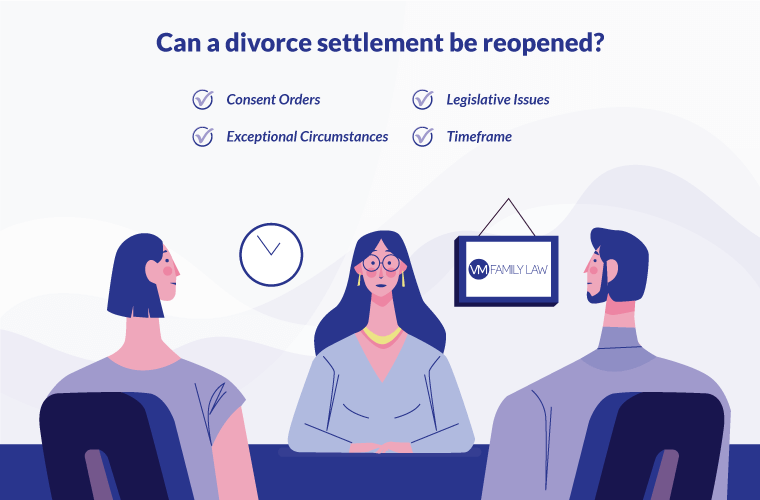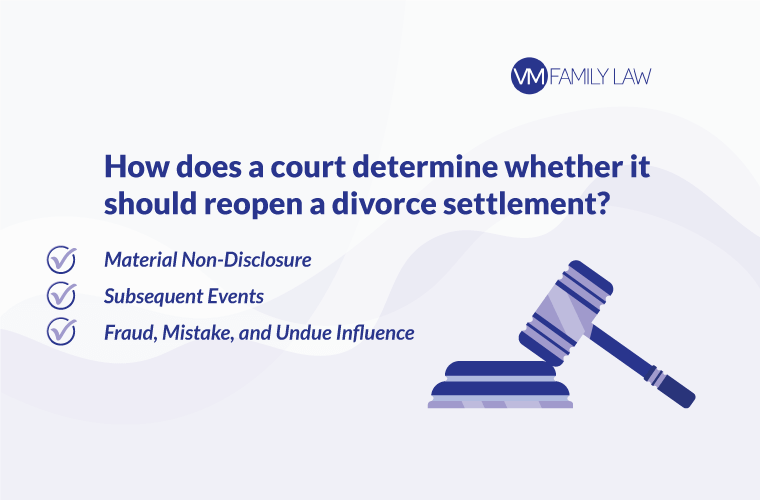Divorce is the final step in a broken relationship, with the acceptance of a divorce settlement marking the culmination of your journey. According to the latest stats, four in ten marriages never meet their 25th wedding anniversaries, but if you fall into this category, what matters is that you receive a fair financial divorce settlement.
But what happens if you’re left unsatisfied with your divorce settlement and would like to revisit it? In England and Wales, there are legal mechanisms to reopen divorce settlements, but the party petitioning to reopen it must have justification.
The bar is also extremely high to reopen Final Court Orders when the settlement order was in full and final settlement of all financial claims arising from the marriage. This guide covers how to tackle the issue of reopening a divorce settlement.
Understanding the legalities of divorce settlements
Divorce settlement orders are legally binding orders outlining how assets will be divided and they set out any future obligations, such as those relating to spousal maintenance and possibly also child maintenance. The divorce settlement order is considered to be indefinite, and violating it can result in action by the courts to enforce it. Once signed and approved by the court, both parties are bound to the clauses outlined in the divorce settlement order.
If a spouse refuses to obey the terms of the order, an application to enforce the order can be made and the court may issue financial orders to enforce the agreement and order the party in breach of the order to pay the other side’s costs.
Continuing failure to obey can lead to contempt of court charges and court orders to seize assets or even imprisonment. The Child Maintenance Service (CMS) can also assist with enforcement if child maintenance is involved.
Learn more about child arrangement disputes.
Can you appeal a divorce financial settlement?
You cannot appeal a financial order just because you did not like or agree with the settlement ordered by the court, or you have changed your mind about the settlement you previously agreed. You must have grounds to appeal a court order.
For example, this could be a case of a spouse failing to disclose their financial assets, but this is only appealable if the non-disclosure would have affected the outcome and therefore the non-disclosure usually needs to be substantial. Like the rest of the divorce process, it is governed by specific rules and procedures. Usually, you’ll need to appeal to a higher court than the one that issued the original order.
Appealing a divorce settlement usually means filing a notice of appeal within 21 days of the date of the decision. Your appeal must specify your grounds for appeal and demonstrate, based on fact or law, that the original decision was incorrect.
Appeals can fall outside of this 21-day limit, but it usually means that relevant facts about the circumstances of the settlement don’t emerge until later.
Can a divorce settlement be reopened?

Divorce settlements in law do not expire. These agreements are designed to last indefinitely, but some circumstances may give either party grounds to reopen their settlement if certain conditions are met.
Factors that influence whether a settlement can be altered include:
· Consent Orders – If a Consent Order has been finalised, this usually means financial ties are legally considered to be severed if the order was made in full and final settlement of all financial claims arising from the marriage.
· Exceptional Circumstances – Scenarios involving non-disclosure, fraud, or significant mistakes can lead to a review. These cases tend to be the exception, rather than the norm.
· Legislative Issues – The Matrimonial Causes Act 1973 could give you grounds to reopen your settlement. This legislation outlines the different criteria that can be considered when finalising settlements. If these aren’t adhered to, it could lead to reopening the settlement.
· Timeframe – Some orders, especially if maintenance is involved, can result in applications to vary or discharge the maintenance order if there has been a significant change in circumstances since the original order was made.
In short, divorce settlements can be reopened, but it’s not designed to be easy. Simply because you feel like you’ve been wronged isn’t going to be enough to reopen your case alone. Instead, there must be justification grounded in fact or law to reopen a divorce case.
How does a court determine whether it should reopen a divorce settlement?

The standard position the courts will take is that divorce settlements are final. Any application to reopen a divorce settlement will look for exceptional circumstances, rather than just because one or both parties aren’t happy.
Here are the three primary points a court will focus on:
1. Material Non-Disclosure – The most common reason divorce settlements might be reopened is that one or both parties didn’t disclose their financial information or significant assets. However, the non-disclosure must be significant and mean that it would have affected the settlement ordered/agreed.
2. Subsequent Events – Significant events soon after the divorce settlement could be grounds for a change in the settlement. These could be substantial changes to the financial circumstances of one party. Alternatively, they might be “barder” events, such as if one party passes away soon after the settlement.
3. Fraud, Mistake, and Undue Influence – If fraud, mistake, or undue influence were involved in formulating the initial settlement, courts may see coercion or an agreement entered into under false pretences. If this is proven, the agreement can be reopened.
Precedent tells us that the sooner you make an application to reopen a settlement, the higher your chances of the courts seeing it your way. What matters is that you hire an experienced lawyer to drive this process. Believe it or not, just two in five divorcees use a lawyer to manage their financial settlements, and it often ends with issues for those who don’t.
When divorce settlement cases can be reopened
Divorce settlement cases can be reopened, but being dissatisfied with the outcome of a divorce settlement isn’t sufficient justification. Courts take the standard position that finalised settlements are to be respected and are indefinite.
Generally, you’ll need to prove that there were substantial changes in financial circumstances immediately post-settlement, genuine mistakes in law or process, or the information used to reach the original settlement was prejudiced in some way, such as through fraud or non-disclosure.
In short, it’s possible, but the threshold is high. That’s why working with expert divorce solicitors at VM Family Law is essential for presenting your case and increasing your chances of getting your settlement reopened. To learn more about initiating the process, contact us today.
